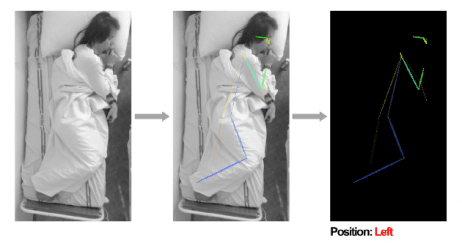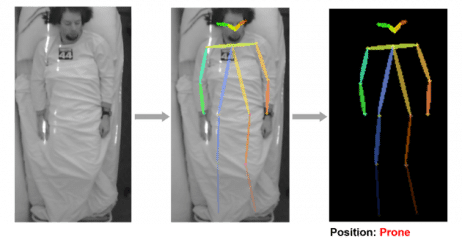The problem
Pressure ulcers, also known as bedsores or decubitus ulcers, are a common problem in bedcare facilities (such as hospitals) occurring across the world. They are injuries of the skin and soft tissues which occur due to prolonged pressure. The local prolonged pressure limits blood circulation and minimizes oxygen and nutrient delivery into tissues, proportionally to the duration of the pressure. They are particularly prevalent in patients who cannot change position by themselves and spend most of their time in a specific position in bed.
The occurrence of pressure ulcers can tell a lot about the quality of care in hospitals and in many countries it is even used as one of the official metrics for evaluation of the medical care quality.

A GoodAI developer demonstrates the technology.
An irreplaceable step to prevent pressure ulcers is repositioning of the patient at regular intervals. Patient care standards in healthcare facilities are based on long-term practice and aim to prevent bedsores by the regular repositioning of immobile patients. These standards currently lack the procedures for positioning selected groups of patients and individuals, so-called personalized and individual standards. Many hospitals face the challenge of not having enough personnel to keep track of patients around the clock. In some cases, such as in older patients or patients with associated diseases, it can take just a few hours to develop the sores, making prevention even more challenging.
Phase 1: developing our solution
We have undertaken pilot tests with Hospital Na Bulovce in order to develop an AI-powered image analysis solution to predict the likelihood of patients developing ulcers, using just the images from a simple camera.
During the pilot, developers from GoodAI were posing as patients at the hospital. A small camera was placed above their bed which allowed for real-time analysis. We tested the solution with both a color and a black and white IR-illumination camera.

A GoodAI developer demonstrates the technology.
Using IR-illumination cameras allowed the solution to work at night, and in dark conditions, and thanks to advanced image processing algorithms we could determine the position when the patient is under a blanket.
The solution can determine if a patient is at risk of developing pressure ulcers due to prolonged pressure and can show a history of positions that they have been lying in that day. Once deployed in a hospital environment, it will be able to alert the medical personnel when repositioning is needed, effectively serving as an extra pair of eyes looking after the patient 24/7.
There are other solutions on the market at the moment which involve pressure sensors being integrated in mattresses. They are effective but can be expensive, require regular cleaning, and can restrict the airflow. Our solution is non-intrusive, respects the privacy of the patients, and is fully GDPR compliant — the images from the camera are only used for determining the patient’s position during their stay and are not stored nor displayed anywhere.
Phase 2: our vision for applying the technology
We are in the early phase of this project and we are looking for new innovative partners to help us advance the research and development of our technology. The results so far have been very promising and we believe that once fully developed this solution has the potential to scale very fast. It could become commonly used in hospitals and care homes across the globe. Our vision is that our AI will keep improving and learning from anonymized patient data, as the network of the adopters of this technology would grow bigger.
We are looking for hospitals and other healthcare providers, who would want to continue the pilot project with us at their facilities. Or health equipment manufacturers who would want to integrate our solution.
Contact the GoodAI by emailing applied@goodai.com if you are interested in collaborating.
GoodAI and Bulovka Hospital are still working on other solutions to improve patient care. You can find out more about GoodAI’s healthcare solutions at www.goodai.com/healthcare. They include a system which monitors and analyses a patient’s rehabilitation routine and can alert nurses and doctors in case a patient is at risk or simply needs help getting out of bed.






